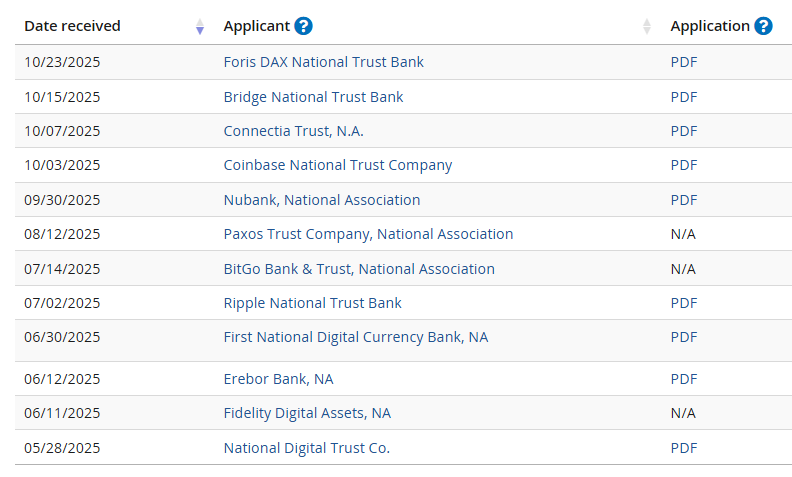The Office of the Comptroller of the Currency (OCC) has been pressured to turn down Sony Bank’s bid to enter US crypto banking. According to reports, letters from banking and community groups filed in early November have raised sharp opposition about the plan and its possible effects. One might say the banks are dancing the tango-except Sony is twirling with a crypto coin instead of a partner. 🤡
Sony’s Bank Plan
Sony Bank filed to form a national trust bank called Connectia Trust, according to filings and public reports. The plan would allow Connectia to manage reserves for a US dollar-pegged stablecoin and offer custody and asset-management services for digital tokens. If this sounds like a masquerade ball where everyone’s in costume, you’d be right. 🎭
The OCC issued Interpretive Letter 1183 in March 2025, which clarified that national banks may perform certain crypto activities when they meet risk controls. Trust banks, however, do not take FDIC-insured deposits, and that difference is central to the debate. A very British affair, really-rules for the “haves” and loopholes for the “have-nots.” 🕊️
Advocates say the structure fits within the narrow scope the OCC laid out in Letter 1183. Critics say it does not. Ah, the eternal struggle between those who love a good loophole and those who prefer the rules to be… less flexible. 🤷♂️

Questions include how reserves would be composed, how redemptions would work in stress, and what would happen to custody holdings if the trust were placed into receivership. One wonders if the OCC has considered hiring a dramaturge to stage-manage these “what-ifs.” 🎭
Community bank groups and consumer advocates want clearer, more public explanations of those mechanics. Perhaps they’ll host a TED Talk titled “How Not to Lose All Your Money in 10 Days.” 🎤
Banking Groups Push Back
On November 6, 2025, the Independent Community Bankers of America (ICBA) sent a formal letter urging the OCC to reject the application. A well-rehearsed monologue from the traditionalists, if you ask me. 🎩
ICBA’s main point is that a trust charter could let a large corporate owner offer a product that looks like a deposit but lacks deposit insurance and typical bank obligations. A “faux-bank,” if you will. Or, as my grandmother might say, “a fox in a financial suit.” 🦊
They called this a form of regulatory arbitrage and warned it could create unfair competition for smaller banks. The National Community Reinvestment Coalition also filed opposition, arguing the OCC lacks authority to treat a stablecoin issuer like a traditional bank and calling for stronger consumer protections. A chorus of “not on my watch!” from the old guard. 🚩

Those groups have focused on three practical concerns: consumer confusion about what is and is not insured, unclear reserve transparency, and the lack of tested tools to resolve a trust bank that holds crypto assets. If only there were a “Crypto Clarity Act” to sort this out. 🧼
The letters stress the potential consequences of a run on a large stablecoin and the difficulty of unwinding token custody in a crisis. Imagine trying to untangle a knotted scarf during a hurricane-only the scarf is made of code. 💻🌪️

Systemic And Consumer Risks
If a federally chartered trust issues a widely used stablecoin, it could set a legal precedent that other tech firms or financial firms might follow. A domino effect, but with more zeros on the balance sheet. 🎲
That is why some filings argue the OCC should move slowly and demand stricter conditions. Reports have disclosed worries that retail users could treat the token like a bank deposit, when it would not carry FDIC protection. A lesson in trust-literally and figuratively. 🤞
The risks are not just theoretical. Under stress, reserve assets might be sold quickly, and digital holdings could be hard to transfer within a receivership framework that was built for traditional assets. A grand performance of chaos, if ever there was one. 🎭
Read More
- Gold Rate Forecast
- 10 Worst Sci-Fi Movies of All Time, According to Richard Roeper
- ‘The Night Manager’ Season 2 Review: Tom Hiddleston Returns for a Thrilling Follow-up
- New horror game goes viral with WWE wrestling finishers on monsters
- ‘I Can’t Say It On Camera.’ One Gag In Fackham Hall Was So Naughty It Left Thomasin McKenzie ‘Quite Concerned’
- Marvel Studios’ 3rd Saga Will Expand the MCU’s Magic Side Across 4 Major Franchises
- Disney’s Biggest Sci-Fi Flop of 2025 Is a Streaming Hit Now
- Pokemon Legends: Z-A Is Giving Away A Very Big Charizard
- Brent Oil Forecast
- ‘John Wick’s Scott Adkins Returns to Action Comedy in First Look at ‘Reckless’
2025-11-14 20:26